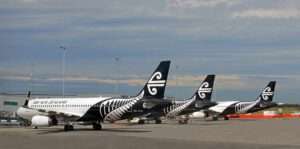Air New Zealand drops emission target goals blaming high price of SAF

However, the carrier said it was committed to an industry-wide target of net-zero emissions by 2050.
Aviation is deemed responsible for about 2% of the world's emissions but is considered one of the hardest sectors to decarbonise, Reuters reported.
"Many of the levers needed to meet the target, including the availability of new aircraft, the affordability and availability of alternative jet fuels, and global and domestic regulatory and policy support, are outside the airline's direct control and remain challenging," New Zealand's flag carrier said in a statement.
Airlines are banking on SAF and more efficient aircraft to reduce emissions in the near-term, but its production is expensive and challenging to ramp-up.
Many environmental advocates say aviation industry growth is fundamentally incompatible with sustainability.
Air New Zealand in 2022 said it wanted to reduce carbon intensity 28.9% by 2030 compared with 2019 levels, in a methodology validated by the Science-based Targets initiative (SBTi), a U.N.-backed corporate climate action group.
The target went further than a 2023 agreement by the global aviation industry to lower carbon emissions by 5% by 2030.













